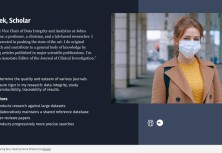
About Victor Udoewa

SDN Accredited Service Design Master
 CDC,
Service Design Lead
CDC,
Service Design Lead
Hello, I'm the CTO, CXO, and Service Design Lead in the NASA Small Business Innovation Research and Small Business Technology Transfer (SBIR/STTR) Programs. Prior to NASA, I served as the Director of Strategy at 18F, a civic consultancy for the federal government inside the federal government. I helped to start the education business unit, develop a line of educational products and services, direct strategy, manage the group of digital strategists and the digital strategy practice, and serve as a designer and strategist on partner projects. Previously, as a Global Education Instructional Designer and Training Development Specialist at Google, I had the wonderful opportunity to design learning experiences and learning software for people in low-to-middle-income countries around the world. The education could range from experiences covering how to develop web applications and how to use the internet to improve teaching and learning, to experiences exploring how to use internet technologies in post-disaster emergency response situations as well as global digital literacy. As a part of that work, I also advised Google in global energy and access work.
In addition to SDN, I'm also an active member in the Service Design College (they produce the Service Design Days) and I co-facilitate a community of practice of 200 service designers in the government at all levels (municipal/city/town, country, state/province/territory, national/federal).
To me, service design means...
Researching, ideating, designing, prototyping, measuring, and iterating on both a service and the mechanics behind the service (organizational structure, business models, communications, processes, policy, props, technology, etc.) to improve both the customer experience and the employee experience across multiple touch points and interactions, both digital and non-digital, online and offline.
Share your favorite projects with our community:
Helping the Next 4 Billion Go Online Part I
In 2015, over two hundred million people, around the world, went online for the first time bringing the number of people worldwide using the Internet to 3.2 billion. Still, a majority of the world, about 4.2 billion, is offline. The barriers to going online and becoming digitally literate can be greater than just infrastructural obstacles, including psychosocial barriers related to incentives, affordability, and user capability. Our goal is to help the next 4 billion go online by designing an educational solution to equip people with digital literacy skills to improve their lives. We have employed a human-centered design methodology through community research, synthesis, ideation, and prototyping to build solutions first for northern and central India. The design may be re-contextualized in order to scale to new locations. This work focuses on the research and synthesis phases of our design process during which we first define digital literacy relevant to the local context and then conducted fieldwork to collect stories, observations and quotes from numerous communities with varying levels of digital literacy. That feedback was translated into insights, themes, and frameworks that will later inform the design and development of an educational technology intervention.
Helping the Next 4 Billion Go Online Part II
In 2015, over two hundred million people, around the world, went online for the first time bringing the number of people worldwide using the Internet to 3.2 billion. Still, a majority of the world, about 4.2 billion, is offline. The barriers to going online and becoming digitally literate can be greater than just infrastructural obstacles, including psychosocial barriers related to incentives, affordability, and user capability. Our goal is to help the next 4 billion go online by designing an educational solution to equip people with digital literacy skills to improve their lives. We have employed a human-centered design methodology through community research, synthesis, ideation, prototyping, and piloting to build solutions first for northern and central India. The design may be re-contextualized in order to scale to new locations. This work focuses on the ideation and prototyping parts of the design phase and the initial pilots of the delivery phase, which are still in progress.
System Futures for a Racially Just School Community
I am working with my school community and Kindred (a nonprofit) to use both systems practice (a way of mapping a system and finding the right leverage points to improve the system health) and futures design (a methodology to design for the future as opposed to today) to engage members of the school community in the process of transformationally envisioning and then enacting a racially just future.
We are piloting this work at 2 schools in DC - one is a public charter school and the other is a public traditional school.
In the end, we will have a future vision of an equitable school community, a roadmap of design experiments of strategic foresight decisions they will lead us to that vision, and a way of measuring progress. Lastly, it will allow us to develop a toolkit and a replicable process that Kindred can use at other schools and share with the wider education justice community.
Video (2nd video)
Victor’s contributions
How to contribute
Related members From the same Country






